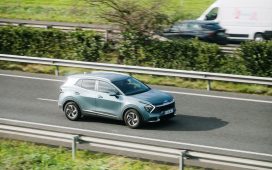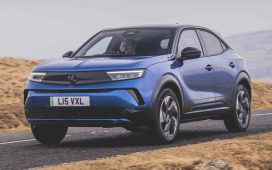Where we’re going, we don’t need roads: these 4x4s are capable on just about any surface
When it comes to steamrollering the sales charts you really need an SUV these days, especially as the appeal of their rugged looks and raised ride heights shows no signs of waning. Yet despite their off-roader aping style, these machines are little more than family hatchbacks with some tough tinsellng – drive any further off the beaten track than the odd gravel car park and you’ll be left marooned and mired in mud. If you really want to climb every mountain and ford every stream then you’ll need a proper rough-and-tumble 4×4.
And that’s exactly what the cars listed here are, proper mud-plugging machines that have been designed to tackle the sort of terrain that would make a mountain goat think twice. As ever, the choices when it comes to this class of car aren’t straightforward, as some prioritise off-road performance above all else while others are the consumate all-rounders, as happy bouncing over boulders as they are tearing along Tarmac. And that’s before you start getting bogged down (well, maybe not in these machines) in the details about breakover angles, wading depths and axle articulation, not to mention locking differentials and low-range gear ratios.
Yet whatever your off-roading wants or needs, there should be something in our top 10 of topography tamers that should suit your requirement and budgets.
1. Land Rover Defender
After a preamble that lasted more than a decade, Land Rover finally showed off the long-awaited follow-up act to the original Land Rover in 2019 and launched the car in showrooms in 2020. Having switched from a ladder-frame construction to a monocoque, and for plenty of reasons otherwise, this new Land Rover Defender is more of a successor than a direct replacement – and some feared that it wouldn’t have quite the same kind of mud-plugging, rock-hopping, water-fording, slope-scaling and axle-twisting prowess as a result.
The new Defender can do almost all of that and more, however. With approach and departure angles of around 40deg, and ground clearance of as much as 291mm thanks to its height-adjustable air suspension, this car has all of the right vital statistics. And yet it’s the style in which is tackles off-road driving, and the way it eases the load on the driver to select just the right transmission mode, to maintain just the right amount of forward momentum, and to keep to just the right line through those ruts, that really impresses. And while its square-rigged predeccessor’s all-wheel drive system was simplicity itself, the latest car’s is the height of sophistication, with the brand’s trick Terrain Response system allowing even off-road novices to tackle the most challenging off-road obstacles.
Land Rover now offers four-, six-, and eight-cylinder engines for the car, but the P400e plug-in hybrid has become the only four-pot available, while all the diesels are now in-line sixes. The range-topping P525 V8 version certainly has performance and presence to spare, but the D300 diesel is our pick of them all because it combines plenty of torque with respectable fuel economy, drivability and refinement and needn’t cost as much as some of the other versions of the car. For fleet users and urban dwellers, of course, the P400e plug-in hybrid (which has a claimed electric range of 27 miles) will have it own particular lures.
The Defender’s available in both three-door 90 and five-door 110 and 130 bodystyles (that latter featuring a long rear overhang that slightly impairs its departure angle), as well as as a Hardtop commercial if you prefer – and whichever you go for, you’ll find it’s a wide, tall and heavy car that isn’t ideally suited to the narrowest of tracks or green lanes. But that acknowledged, this 4×4’s capabilities remain beyond question, and the way in which it sets about its work off road makes it seem like a car built for people who don’t even like off roading.
Offering all that in a car that also rides and handles so well on the road is the icing on the cake, and makes this car stand head and shoulders above its rivals. ‘The best 4×4 by far’ has been given a whole new lease of life.
Save money with new Defender deals from What Car?

2. Jeep Wrangler
Jeep doesn’t revitalise the Wrangler very often, but the latest generation is more usable than ever on the road as well as more capable off it. That Jeep has carefully preserved the much-loved design – whose circular headlights, famously seven-slatted grille and strict geometry are recognisable still from the original Willys MB jeeps first deployed in World War II – is only part of the appeal. The interior is now more spacious and less cheaply and sparsely finished, which goes hand in hand with the improved efficiency of the car’s downsized engines and better road manners. (Everything is relative, mind.)
Of course, the Wrangler is still spectacular off the beaten track, especially in three-door Rubicon trim with its ladder-frame, locking differentials, knobbly tyres, specialised articulating axles, underbody bracing, and outstanding approach and departure angle statistics. It just wouldn’t be as nice to live with every day as the Land Rover Defender, hence its second-place ranking. That’s partly down to on-road manners that are considerably less salubrious than its British rival’s, with far less accurate handling, a more hyperactive ride and ear-bashing levels of ‘refinement’. Still, if you’re handy with a spanner, you can remove the Wrangler’s roof for some wind-in-the-hair thrills.
There are now only four-cylinder petrol versions of the Wrangler on official UK sale, with the four-pot diesel having been removed from showrooms, and other options available only through ‘grey’ (private) import. These include the Dodge Challenger-engined 6.4-litre V8 special-edition Jeep Wrangler Rubicon 392 form, which is the Wrangler in its wildest and most unstoppable form.
Save money with new Wrangler deals from What Car?
![]()
3. Toyota Land Cruiser
Another icon – one that has historically been the workhorse of choice in the Australian Outback, a place where breaking down simply won’t do. This is an old-school off-roader with a body-on-frame construction and big numbers in all departments. For towing, wading and low-ratio, grind-it-out driving across truly inhospitable ground, the Land Cruiser scores very highly. Basic-spec Utility versions, identifiable by their steel wheels, are genuinely affordable; three-door passenger versions aren’t much pricier; and five-door Invincible-spec cars offer packed-out equipment rosters and seating for up to seven.
But while you can specify the Toyota with air suspension and leather seats, don’t expect it to ride and handle like a monocoque SUV from Audi or Mercedes-Benz. It’s a different beast – less sophisticated on the motorway but in another league in places where you might actually need a car like this, with a reputation for mechanical dependability and unbreakable toughness that’s jealously regarded by every one of its competitors.
Save money with new Land Cruiser deals from What Car?

4. Mercedes-Benz G-Class
The best off-roaders tend to stick around. Both the Wrangler and the Land Cruiser have been with us for decades, and it’s the same with the G-Wagen (technically now the G-Class, but you’ll forgive us the nostalgia).
This Mercedes – the only one without an official ‘end of production’ date – recently received the only truly substantial redesign in its 40-year history. Underneath, you’ll still find a ladder-frame chassis, although the front suspension is now fully independent and the whole set-up was part-developed by AMG. The result is car with three locking differentials, improved ground clearance and the same immense off-road abilities as before; but now also one that handles predictably and, at times, even quite enjoyably on the road. A move to rack and pinion steering has made the biggest difference there. However, Mercedes has also been cute with the period details, so the G retainS the old car’s traditional handles with push button locks while the catches themselves are similar, meaning the doors close with same retro ‘clack’.
Our pick the is the creamy straight-six diesel in the G400d, although it’s possible to get a full-on Mercedes-AMG G63 with a twin-turbocharged petrol V8 making almost 600bhp, assuming you’ve got a Premier League footballer’s budget to spend and don’t mind attracting attention – not all of it positive. That said, neither model is cheap, with even the ‘entry-level’ diesel setting you back an eye-watering £131,095.
Save money with new G-Class deals from What Car?

5. Land Rover Discovery
You might wonder why the fifth-generation Land Rover Discovery doesn’t sit higher up this list, even given the calibre of the cars above. It is, in the grand scheme, terrifically competent off road but matches that with wonderful road manners for an all-round package that none of the others can quite compete with. Everywhere the Discovery goes, it does so with a calm assurance.
It isn’t, however, quite as gritty, grippy or tenacious as some cars when the going gets really tough. That said, few are as easy and stress-free to drive in the rough stuff, the brand’s advanced Terrain Response system effectively doing much of the hard work, meaning all you need do is steer the Disco up hill and down dale. In fact, with the Progress Control function engaged all you need to do is steer, the system working like an off-road cruise control to keep your speed exactly on point for tackling the rough stuff.
A facelift for the 2021 model year brought new six-cylinder engines to the car of both the petrol- and diesel-sipping varieties, as well as updated suspension and some fresh interior features, and kept a likeable and very versatile car high in our estimations – although the need for seven-seats means there’s no room for the battery and motor required to deliver a plug-in hybrid version. In fact, we’re not the only ones, because after a slowish start in showrooms the Discovery is starting to sell like hot cakes as buyers cotton on to its compelling belding of luxury, refinement, space and unsurpassed off-road talent.
Save money with new Discovery deals from What Car?

6. Ineos Grenadier
The Ineos falls just outside our top five for now, mainly because the only real time we’ve spent behind the wheel of the original Defender-aping machine is off-road. Yet that’s been enough to confirm the Grenadier is up with the best when it comes to conquering the wilderness, its abilities in the rough matching those of the British classic that has so clearly influenced its design.
In keeping with traditional 4×4 philosophy, the Ineos features a traditional ladder frame chassis and a pair of live axles. But to this it adds sophisticated BMW engines (a choice of 3.0-litre six-cylinder petrol of diesel units), a ZF eight-speed automatic gearbox and Tremac dual range transfer ‘box for proper rock-crawling ability. Factor in ground clearance just shy of 260mm, a trio of differential locks plus approach and departure angles of 35.9 degrees and the Grenadier is as unstoppable in the rough as you’d expect, barely breaking a sweat as its scrabbles up and over challenging terra firma.
Off-road ability and a no-nonsense utility underpin the car’s character, but there’s also softer side to the Ineos. It’s interior is roomy and melds thoughful ease-of-use with just enough luxury to appeal to the premium badge brigade, while our limited taster on road revealed a machine that’s closer in spirit to the Mercedes G-Wagon than the latest Defender, meaning its capable and easy to drive, but lacks the dynamic polish and refinement to be truly car-like.
We’ll have to wait until we has a chance to more fully explore the Ineos on UK roads, but the intial impressions suggest a car high on charm and big on off-roading talent.

7. Ford Ranger Raptor
The original Ranger Raptor was something of a mixed bag, its weedy 2.0-litre diesel failing to match the talents of a chassis that fooled you into thinking you could tackle a stage of the Dakar rally. Happily, the all-new version retains its predecessor’s high speed off-road prowess, but it now packs a little more muscle in the from of a 288bhp turbocharged 3.0-litre V6.
In truth, the Raptor this makes the Raptor brisk rather than quick on the road, but there’s enough punch to surprise more than a few slumbering sports saloons while the rortier engine note is much more pleasing to the ear than the old four-diesels drone. It’s still a big car mind, and with chunky off-road tyres and long travel suspension it lacks the precision, poise and grip Tarmac you’d normally expect from a go-faster Blue Oval model, plus the 10-speed auto can prove a little indecisive when left to its own devices.
As before, it’s the Ford’s uprated suspension that shines the brightest, the clever electronically-controlled Fox ‘Live Valve’ adaptive dampers helping smooth any terrain that rolls under its wheels. On the road that means a supple and controlled ride, while in the rough stuff the Ranger can tackle ragged and torn terrain at speeds that would likely leave traditional 4x4s needing to be swept into a carrier bag at the end of the route.
It’s still a niche choice and you’ll have to access to a deserted quarry or gravel rally stage to really unlock the Raptor’s true potential, but that doesn’t stop us wanting one.

8. Suzuki Jimny
Suzuki markets the Jimny as the world’s only lightweight proper off-roader, which is all very true, refreshingly. The car weighs just over 1100kg but uses a ladder-frame chassis with rigid-axle suspension at each end and a low-ratio four-wheel-drive gearbox. There are, alas, no locking differentials, but with price starting under £20,000, nor would you expect there to be.
This thing really works off road, as we’ve demonstrated with a twin test against a Toyota Land Cruiser. Indeed, with tiny overhangs, its approach, breakover and departure angles are all superior to those of the Wrangler, which is quite something, and being so small and light makes it surprisingly spry on mud and gravel and pleasingly easy to handle.
You will also, we guarantee, fall for the Jimny’s kei car looks. Which is just as well, because its naturally aspirated 1.5-litre petrol engine isn’t particularly economical, its boot is tiny, its road manners are only a notch or two above dismal and it can be particularly alarming when you need to stop in a hurry.
If there’s a downside, it’s that Suzuki UK withdrew the Jimny from sale in 2020 due to its incompatibility with tightening emissions laws, replacing it with a commercial version. That means the Japanese machine is now a strict two-seater (although boot space has increased massively), which means it won’t suit families looking for a compact off-roader. Yet given the fact that most Jimnys are bought as fun runarounds, this change in classification shouldn’t be too much of a problem, while plumbers, electricians and delivery drivers needing to access customers in the hardest-to-reach locations now know where to look for their next van.
Save money with new Jimny deals from What Car?

9. Ssangyong Rexton
This is the full-sized, go-anywhere off-roader for the value-savvy buyer. The Ssangyong Rexton hasn’t always been as tidy-looking a car as it is now, but it’s always been a proper 4×4. In this latest version, you get seven seats, ladder-frame construction, lockable mechanical four-wheel drive with low range, electronic hill descent control and a 201bhp, 2.2-litre diesel engine – and all for a price that, in the cheaper of two available trims, can start with a three.
The car handles and performs better than it rides, its ladder-frame chassis making it feel a little crude on the road over lumps and bumps, but it also handles acceptably well for a big car, and its engine and gearbox do a decent job too.
For serious mud-plugging, fixed-height steel-coil suspension and clearance angles that are, in some cases, only just above 20deg aren’t world-beating. But if it’s mostly tracks and fields you have to cross, and you want a big, cost-effective way to cross them, the Rexton might be worth investigating.

10. Dacia Duster
For heading off the beaten track on a tight budget, the Dacia Duster still takes some beating. It’s not as cheap as it was (there’s no all-wheel-drive entry-level Access version now) but a whisker under £21,000 for the Expression dCi 115 4×4 is still cracking value, regardless of vehicle type (you’ll struggle to get a similarly specified supermini for that amount these days).
In terms of off-road kit, it’s not as comprehensively specified as the others in this list, but you get enough to be able to tackle the wilderness with confidence. The trick four-wheel drive system allows you to choose front drive for the road, an Auto mode that quickly engages the rear axle when it detects wheelspin or Lock that sets the torque split at 50:50 for the best off-road traction. There’s also a shorter first gear for climbing steep slopes and hill descent control for scrabbling down the other side. Oh, and the infotainment system features a compass and altimeter, so you know where you’re going and whether you’re about to topple over. Yet the Duster’s best off-road attributes are decent ground clearance and a relatively low kerb weight, allowing it to tiptoe over some obstacles that would sink heavyweight rivals.
Like the best in this list the Duster also takes to Tarmac with aplomb, this second generation machine feeling far more modern and composed than its predecessor. The steering is accurate and reasonably precise, body control is good and there’s more than enough grip. It rides well enough too, with soft and long travel suspension combining with high profile tyres that allow you to tackle speed bumps and potholes with a rare confidence.

However, given that most off-roaders spend much more off their time on the beaten track than off it, it’s good to know the Dacia feels even more at home on the road. Accurate handling and a cushioned ride help here, as do its punchy diesel engine and interior that’s comfortable, well equipped and spacious.













